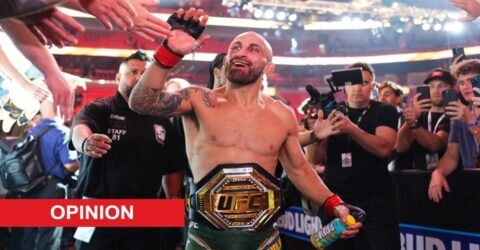The UFC handled COVID-19 better than any other sports organisation, without a doubt. Their ingenuity, relentless attitude and sheer belief allowed them to survive and thrive during this trying time. Whilst other sports slowed down or even came to a complete halt, Dana White found a way, thanks largely in part due to two unique venues – Yas Island and the Apex Arena. For months, the UFC survived through these two locations, one a picturesque island in Abu Dhabi, the other a small, enclosed arena in sunny Las Vegas.
Watching fights at these venues, the Apex especially, allowed fight fans to experience the UFC in a completely new way. Viewers could truly understand the physical toll the fighters put themselves through in the cage, with each stinging shot audible without the usual crowd emotion. One fight that I am sure will immediately spring to mind is Dustin Poirier vs Dan Hooker; an absolute war. For 25 minutes straight, it sounded as though gunshots were going off in the cage due to the vicious shots being absorbed by both men. The Apex worked for this very reason.
However, over time, the novelty began to wear thin and an intense desire for packed-out arenas full of rowdy capacity crowds resurfaced. It was assumed by many that the Apex cards would slow once fans returned to their rightful cageside seats, but this has not been the case. This month alone, there are 2 scheduled Apex cards, with Gilbert Burns taking on Michael Morales; just a week later, Erin Blanchfield will face off with Maycee Barber. So, why should something that was previously so beneficial be brought to an end?
There are many negative aspects to the Apex. Let us start with the obvious: the lack of atmosphere. Elite-ranked fighters such as the aforementioned Burns and Morales are underutilised in a main event held in front of a select few fans. A legend such as Gilbert Burns deserves better. He merits a sold-out arena, a raucous crowd and the opportunity to entertain the thousands in attendance. He also deserves the opportunity to feed off that energy. In staging these fights in the Apex, many fighters appear diminished. Some that previously relied on the atmosphere and energy of a crowd to hype themselves up no longer have this luxury. It lessens fights. In arenas, we see crowds encouraging the fighters to engage, booing when they see stalling, albeit sometimes too hastily, and helping to create a head-on collision inside the cage. However, in the Apex, this becomes lost, replaced instead by an eerie silence, lessening the urgency of fights at times.
Another huge drawback of using this arena is the growing lack of diversity in the locations of cards. Whilst the UFC remains a global show that it once was, it has lost some geographical variety, most notably in Europe. Dublin, Copenhagen, Stockholm, and Glasgow were all locations used frequently in the past. Since the introduction of the Apex, European UFC cards have been limited to just 3 locations: Paris, London and Manchester. This feels like a huge missed opportunity for the UFC. The company has become full of not only European fighters but European superstars. Ilia Topuria of Spain and Georgia, Merab Dvalishvili of Georgia, and Paddy Pimblett of Liverpool, England. These fighters deserve the opportunity to showcase their skills in front of their home fans.
It is not just Europe that has missed out; the previously promised UFC Africa card has never come to fruition, despite the UFC having had 4 African champions in recent years. Kamaru Usman, Israel Adesanya, Dricus du Plessis and Francis Ngannou have all expressed their desire to fight on their home continent, but none have been granted the deserved opportunity. Whilst this isn’t solely the fault of the Apex, financial and logistical issues have also caused roadblocks along the way, even the PFL is managing to host an event in South Africa this July.
It appears the UFC is happy to continue taking the easy route with the Apex. But, easy is not always best. Incredible opportunities await in Spain, Dublin and across Africa. Opportunities seem no closer to becoming reality. Meanwhile, fighters continue to go to war in a near-empty arena.
To progress and grow as an organisation and a spectacle, the UFC should seriously consider limiting the Apex to shows like Dana White’s Contender Series and The Ultimate Fighter. The company, the fans and, most importantly, the fighters who put their bodies on the line in the Octagon will surely benefit.







